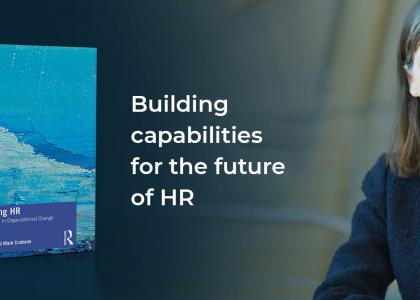20 April 2021
Building Capabilities for the future of HR

In the second of the four-part series of blogs on the role of HR in organisational change, Professor Julie Hodges looks at what capabilities the HR team of the future needs to support ongoing organisational change.
Due to the impact of the global pandemic, the workplace is being transformed at a rate never seen before; changing the way people work, where they work, and even when they work.
These changes demand a shift in the role of HR so that it is better suited to a highly volatile, global, and knowledge- and technology-oriented age. This means HR is responsible for developing a workforce shape and strategy to meet rapidly changing organisational needs and redesigning an employee experience that treats employees like critical stakeholders of change.
So what does HR need to develop in order to focus on the stakeholder-centric consultative change role? The answer is for HR to develop capabilities in different skills, knowledge, and experiences in order to be able to operate with agility and fluidity across an organisation, and to be able to foster intentional collaboration with multiple stakeholders. These capabilities are critical to HR and are based on the research conducted for my recent book ‘Reshaping HR: the role of HR in Organizational Change’, and comprise the following:
1. Business acumen
To understand the context in which organisations operate HR has to learn more about the organisation, including its strategy, goals, aspirations and competitors. This will require business, as well as strategic awareness. HR needs to be able to see the whole jigsaw rather than just a piece of it. This means that
HR Professionals will need to be proactive and develop a commercial awareness of the environment in which the organisation operates.
2. Cultural awareness
Cultural awareness involves connecting and interacting with people in different cultures and recognising the importance of cultural diversity and inclusion, which is vital for HR Professionals working in cross-cultural and multi-cultural settings. Furthermore, cultural awareness concerns not only national, regional, and ethnic cultures but also the sub-cultures within all of these groups.
3. Digital fluency
Digital fluency is the aptitude to effectively and ethically interpret information, discover meaning, design content, construct knowledge, and communicate ideas. This is vital for HR, since automation and artificial intelligence (AI) is changing the nature of work and fuelling the demand for digital skills. Advanced technologies require HR Professionals to understand how they work and to innovate, develop, adapt and service them in the workplace.
4. Data analytics and visualisation
Data analytics and data visualisation capabilities are critical to shaping and intelligently managing the workforce of the future. In order to execute this effectively, the HR function will require capabilities to:
- Translate strategic business decisions into a people agenda through a deep understanding of industry and market trends and associated data models
- Build insights from integrating and analysing data in real time across different data sources in order to understand the signals that point to emerging issues and opportunities and which include combining people data from the organisation and from external data sources
- Take a hypothesis-driven approach by working with the leadership team to use data to answer critical organisational issues and questions, such as: Which capabilities will drive competitive advantage? Which teams create sustainable performance along with team member well-being? What leadership factors drive innovation in the organisation?
- Adopt an evidence-based mindset so that good practices are subject to a rigorous evaluation of validity and relevance
- Deliver against the plans created by workforce shaping, which requires expertise and skills to use data analytics to reconfigure jobs and redeploy workers.
These capabilities will enable HR Professionals (HRPs) to know how to use and manipulate complex data to provide compelling evidence and critical business insights that will form the basis of new workforce strategies and solutions.
5. Managing and engaging people with change
The principles and practice of organisational change must be an integral
part of HR capabilities. HRPs should be experts in change thinking and some change models and be able to use them with people in change scenarios using their language. HR will need the ability to play a dual role in change by initiating and leading the change where it impacts people, and by serving as a facilitator for change/s that leaders and other managers initiate.
6. Consultancy skills
HR requires various consultancy skills including stakeholder agility; learning continuously, and working collaboratively:
- Stakeholder agility. HR consultancy for change is primarily about building and maintaining relationships. This requires stakeholder agility in being able to engage and build rapport and support with stakeholders, and being able to deal with multiple stakeholders in a variety of ways. It is therefore vital that HRPs can build trust and credibility with stakeholders
- Learning continuously. HR requires the ability to learn and reflect on failure as well as success. HRPs need to ensure that they build-in time for reflecting on, and sharing the learning from, every transformational change, as well as facilitating and encouraging learning among stakeholders
- Working Collaboratively. HR consultancy for change involves HR working jointly with stakeholders, such as managers, throughout the change process. This requires the skills to create shared responsibility and ensure that managers develop ownership of the change.
Developing such capabilities as those outlined above has benefits for both HR and for the organisation because it enables HRPs to maximise their contribution to sustainable organisational change for the benefit of the organisation and its multiple stakeholders.
This is the second in a series of four blogs on the role of HR in organisational change, which is the subject of Professor Hodges’ new book: Reshaping HR: the role of HR in Organizational Change. To celebrate, we’re giving away five copies of Professor Hodges’ book. To be in with a chance of winning, just share this blog across your social channels, tagging @Mhr into your post.

